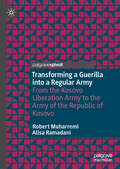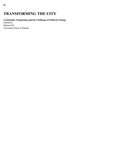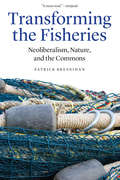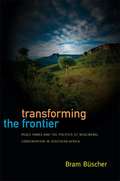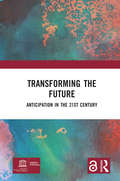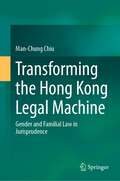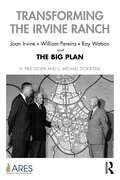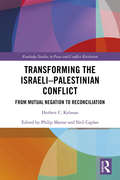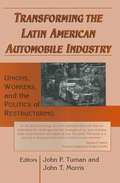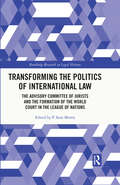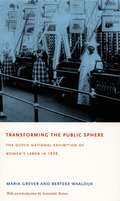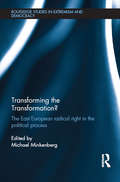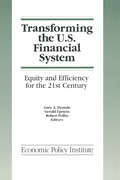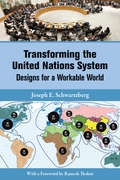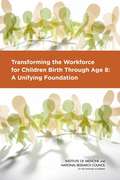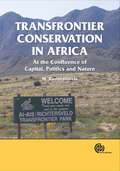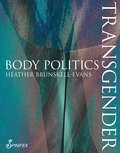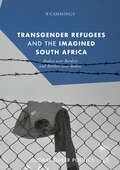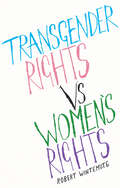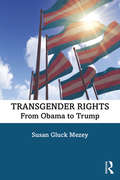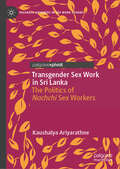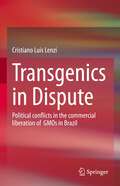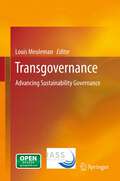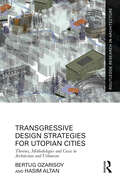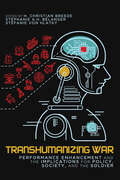- Table View
- List View
Transforming a Guerilla into a Regular Army: From the Kosovo Liberation Army to the Army of the Republic of Kosovo
by Robert Muharremi Alisa RamadaniThis book sheds light on a particularly complex aspect of post-conflict security reform: the transformation of the Kosovo Liberation Army into the Kosovo Security Force, a unique political and legal process. The authors demonstrate how different international and domestic actors played a role in this process and navigated a complex web of international law, political interests and the requirements to maintain peace and security in Kosovo and the region. It makes a special contribution to ongoing discussions on state development and peacebuilding, while acting as a case study for upcoming post-conflict scenarios.
Transforming the City: Community Organizing and the Challenge of Political Change
by Marion OrrAs an avenue for progressive politics in a nation still skeptical of change, community organizing today faces significant challenges. This book assesses that activity within the context of political, cultural, social, and economic changes in cities—from World War II to the present—to show how community-based organizations have responded to these challenges. Transforming the City is the first book to examine the current state of community organizing in American cities, analyzing its place in contemporary progressive politics and assessing whether it has changed in response to changes in the political economy. Leading urban scholars from a wide range of disciplines offer original commentaries on the strengths and limitations of community organizing, a form of political and civic engagement that is too often overlooked by those who bemoan the decline in social capital. While embracing community organizing as a way to cope with the problems afflicting inner cities, these essays acknowledge the challenges inherent in globalization, de-industrialization, the demise of ward-based politics, and the values that shape contemporary American culture. They argue that larger changes in the political economy have reshaped the local ecology of civic engagement, thereby affecting the focus, orientation, and effectiveness of community organizing. The book features case studies from Chicago to New Orleans to El Paso, covering community organizations from many organizing networks and models, such as ACORN, IAF, PICO, and DART. These cases address key policy areas such as education and housing, and the role of race in these issues and in organizing in general. By examining the actual practice of this form of democratic politics, they also show the potential of community organizing for addressing concerns about Americans' disengagement from civic and political life. Whether pursuing longstanding problems about housing or more recent issues such as wages paid by big-box retailers, community organizing continues to have an important role to play as part of a broader progressive movement. As America decides what kind of society it wants to be, these insightful articles illuminate those larger trends in the local ecology that are forcing organizers to alter their strategies, operations, and visions for the future.
Transforming the Fisheries: Neoliberalism, Nature, and the Commons
by Patrick BresnihanThere is now widespread agreement that fish stocks are severely depleted and fishing activity must be limited. At the same time, the promise of the green economy appears to offer profitable new opportunities for a sustainable seafood industry. What do these seemingly contradictory ideas of natural limits and green growth mean in practice? What do they tell us more generally about current transformations to the way nature is valued and managed? And who suffers and who benefits from these new ecological arrangements? Far from abstract policy considerations, Patrick Bresnihan shows how new approaches to environmental management are transforming the fisheries and generating novel forms of exclusion in the process.Transforming the Fisheries examines how scientific, economic, and regulatory responses to the problem of overfishing have changed over the past twenty years. Based on fieldwork in a commercial fishing port in Ireland, Bresnihan weaves together ethnography, science, history, and social theory to explore the changing relationships between knowledge, nature, and the market. For Bresnihan, many of the key concepts that govern contemporary environmental thinking—such as scarcity, sustainability, the commons, and enclosure—should be reconsidered in light of the collapse of global fish stocks and the different ways this problem is being addressed. Only by considering these concepts anew can we begin to reinvent the ecological commons we need for the future.
Transforming the Frontier: Peace Parks and the Politics of Neoliberal Conservation in Southern Africa
by Bram BüscherInternational peace parks--transnational conservation areas established and managed by two or more countries--have become a popular way of protecting biodiversity while promoting international cooperation and regional development. In Transforming the Frontier, Bram Büscher shows how cross-border conservation neatly reflects the neoliberal political economy in which it developed. Based on extensive research in southern Africa with the Maloti-Drakensberg Transfrontier Conservation and Development Project, Büscher explains how the successful promotion of transfrontier conservation as a "win-win" solution happens not only in spite of troubling contradictions and problems, but indeed because of them. This is what he refers to as the "politics of neoliberal conservation," which receives its strength from effectively combining strategies of consensus, antipolitics, and marketing. Drawing on long-term, multilevel ethnographic research, Büscher argues that transfrontier conservation projects are not as concerned with on-the-ground development as they are purported to be. Instead, they are reframing environmental protection and sustainable development to fit an increasingly contradictory world order.
Transforming the Future (Open Access): Anticipation in the 21st Century
by Riel MillerPeople are using the future to search for better ways to achieve sustainability, inclusiveness, prosperity, well-being and peace. In addition, the way the future is understood and used is changing in almost all domains, from social science to daily life. This book presents the results of significant research undertaken by UNESCO with a number of partners to detect and define the theory and practice of anticipation around the world today. It uses the concept of ‘Futures Literacy’ as a tool to define the understanding of anticipatory systems and processes – also known as the Discipline of Anticipation. This innovative title explores: • new topics such as Futures Literacy and the Discipline of Anticipation; • the evidence collected from over 30 Futures Literacy Laboratories and presented in 14 full case studies; • the need and opportunity for significant innovation in human decision-making systems. This book will be of great interest to scholars, researchers, policy-makers and students, as well as activists working on sustainability issues and innovation, future studies and anticipation studies. The Open Access version of this book, available at https://www.taylorfrancis.com/books/e/9781351047999, has been made available under a Attribution-NonCommercial-NoDerivs 3.0 IGO (CC-BY-NC-ND 3.0 IGO) license.
Transforming the Hong Kong Legal Machine: Gender and Familial Law in Jurisprudence
by Man-Chung ChiuThis book examines the law in relation to how it has responded to sexual and gender issues in the context of Hong Kong, and addresses the implications of those responses for the global context. It aims to develop a localized theory of justice which enables the analysis of multiple socio-legal issues arising in Hong Kong, a predominantly Han-Chinese society in Greater China, while also offering formulations for corresponding solutions. Unlike other books on Hong Kong jurisprudence and socio-legal studies, this book not only compares and contrasts different theories of justice, but also attempts to generate a philosophical perspective which can synchronize and re-organize a range of theoretical components via the lens of localization. The author investigates theories of justice developed, respectively, by Rawls, Deleuze, Lacan, Žižek and from the perspective of Mahāyāna Buddhism, as well as (Orthodox) Han-Chinese Confucianism and Daoism. The book applies these theoretical perspectives in analyzing different socio-legal issues in post-97 Hong Kong, including transgender rights to marriage, domestic violence, sexual assault, child sexual abuse and race. The book concludes by proposing singular possible strategies, which include Degenderization, Desexualization, De-ageing, by which justice(s) can hopefully be re-manufactured and challenged. This book is relevant to researchers and students of law, philosophy, sociology, gender studies and cultural studies.
Transforming the Irvine Ranch: Joan Irvine, William Pereira, Ray Watson, and the Big Plan (The American Real Estate Society (ARES) Real Estate Thought Leadership Collection)
by H. Pike Oliver C. Michael StockstillFrom citrus trees to spring breakers, Transforming the Irvine Ranch tells the story of Orange County’s metamorphosis from 93,000 acres of farmland into an iconic Southern California landscape of beaches and modernist architecture. Drawing on decades of archival research and their own years at the famed Irvine Company, the authors bring a collection of colorful characters responsible for the transformation to life, including: Ray Watson, whose nearly century-long life took him from an Oakland boarding house to the Irvine and Walt Disney Company boardrooms Joan Irvine Smith, a much-married heiress who waged war against the US government and the Irvine Foundation's reactionary board and won William Pereira, the visionary architect whose work became synonymous with the LA cityscape. Spanning the history of modern California from its Gold Rush past to the late 1970s, Transforming the Irvine Ranch chronicles a storied family’s largely successful attempts to remake the vast Irvine Ranch in its own image.
Transforming the Israeli-Palestinian Conflict: From Mutual Negation to Reconciliation (Routledge Studies in Peace and Conflict Resolution)
by Herbert C. KelmanThis book is a collection of essential essays on resolving the Israeli-Palestinian conflict by eminent social psychologist Herbert C. Kelman. Few experts or practitioners know the Israeli-Palestinian conflict as well as Kelman, and for over forty years he has conducted interactive problem-solving workshops at Harvard University and elsewhere, engaging more than one hundred Israeli, Arab and Palestinian political activists, journalists and intellectuals in constructive dialogue. Spanning the years 1978 to 2017, the essays gathered here are still relevant today, and attest to the author’s broad empathy for Palestinians and Israelis and his passionate pursuit of a resolution of their conflict based on consistent principles that satisfy the essential psychological needs and minimum political interests of both. The selected essays are not only insightful academic papers, but also serve as snapshots-in-time of the ebb and flow of conflict and peace efforts as well as guideposts for future would-be negotiators and facilitators. This volume will be of much interest to students of Middle Eastern politics, peace and conflict studies, and international relations, and will help would-be negotiators and mediators in practice.
Transforming the Latin American Automobile Industry: Union, Workers and the Politics of Restructuring (Perspectives On Latin America And The Caribbean Ser.)
by John P. Tuman John T. MorrisThis study looks at union responses to the changes in the Latin American car industry in the last 15 years. It considers the impact of the shift towards export production and regional integration, and the effect of political changes on union reponses.
Transforming the Politics of International Law: The Advisory Committee of Jurists and the Formation of the World Court in the League of Nations (Routledge Research in Legal History)
by P. Sean MorrisThis volume examines the role of League of Nations committees, particularly the Advisory Committee of Jurists (ACJ) in shaping the statute of the Permanent Court of International Justice (PCIJ). The authors explore the contributions of individual jurists and unofficial members in shaping the League’s international legal machinery. It is a companion book to The League of Nations and the Development of International Law: A New Intellectual History of the Advisory Committee of Jurists (Routledge, 2021). One of the guiding principles of the book is that the development of international law was a project of politics where the idea and notion of an international society must contend with the political visions of each state represented on the different legal committees in the League of Nations during the drafting of the Covenant. The book constitutes a major contribution to the literature in that it shows the inner workings of some of the legal committees of the League and how the political role of unofficial members was influential for the development of international law in the early twentieth century and how they influenced the political and legal process of the ACJ. The book will be an essential reference for those working in the areas of International Law, Legal History, International Relations, Political History, and European History.
Transforming the Public Sphere: The Dutch National Exhibition of Women's Labor in 1898
by Maria Grever Berteke WaaldijkIn 1898, the year Queen Wilhelmina of the Netherlands was inaugurated, five hundred women organized an enormous public exhibition showcasing women's contributions to Dutch society as workers in a strikingly broad array of professions. The National Exhibition of Women's Labor, held in The Hague, was attended by more than ninety thousand visitors. Maria Grever and Berteke Waaldijk consider the exhibition in the international contexts of women's history, visual culture, and imperialism. A comprehensive social history, Transforming the Public Sphere describes the planning and construction of the Exhibition of Women's Labor and the event itself--the sights, the sounds, and the smells--as well as the role of exhibitions in late-nineteenth-century public culture. The authors discuss how the 1898 exhibition displayed the range and variety of women's economic, intellectual, and artistic roles in Dutch culture, including their participation in such traditionally male professions as engineering, diamond-cutting, and printing and publishing. They examine how people and goods from the Dutch colonies were represented, most notably in an extensive open-air replica of a "Javanese village. " Grever and Waaldijk reveal the tensions the exhibition highlighted: between women of different economic classes; between the goal of equal rights for women and the display of imperial subjects and spoils; and between socialists and feminists, who competed fiercely with one another for working women's support. Transforming the Public Sphere explores an event that served as the dress rehearsal for advances in women's public participation during the twentieth century.
Transforming the Transformation?: The East European Radical Right in the Political Process (Extremism and Democracy)
by Michael MinkenbergTransforming the transformation? The East European Radical Right in the Political Process examines the significance of radical right parties, along with other organizations, in terms of their involvement in the political process of new democracies. This groundbreaking study highlights firstly the radical right’s interaction with other political actors, such as parties, governments and interest groups, in their respective countries. Secondly, the contributors analyze the effects of such interaction with regard to agenda setting and policies in "loaded" policy fields, namely minorities and immigration, law and order, religion, territorial issues and democratization. Through an examination of the role of radical right actors in political processes and an assessment of the resulting measurable outcomes, this book shows how policies, election results and regime changes indicate shifts away from the liberal-democratic order institutionalized in the course of post-Communist transformation. Offering a unique cross-national comparison of particular facets and themes, as well as in-depth analysis of country cases, this book will be of interest to undergraduate and postgraduate students, as well as scholars, of European politics and far right studies.
Transforming the U.S. Financial System: An Equitable and Efficient Structure for the 21st Century (Economic Policy Institute Ser.)
by Robert Pollin Gerald Epstein Gary DymskiThis work challenges the conventional understanding of Hong Kong's political culture as one of indifference. It takes a historical look at political participation in the former colony and includes an in-depth analysis of 13 selected cases.
Transforming the United Nations System: Designs for a Workable World
by Joseph E. SchwartzbergGlobal problems require global solutions. The United Nations as presently constituted, however, is incapable of addressing many global problems effectively. One nation- one vote decisionmaking in most UN agencies fails to reflect the distribution of power in the world at large, while the allocation of power in the Security Council is both unfair and anachronistic. Hence, nations are reluctant to endow the United Nations with the authority and the resources it needs. Extensive reform is essential.This analysis is rooted in the proposition that the design of decisionmaking systems greatly affects their legitimacy and effectiveness. Joseph Schwartzberg proposes numerous systemic improvements to the UN system, largely through weighted voting formulas that balance the needs of shareholders and stakeholders in diverse agencies. It indicates ways in which the interests of regions can supplement those of nations while voices of nongovernmental organizations and ordinary citizens can also be heard. In numerous contexts, it promotes meritocracy and gender equity.The book's aim is not to create an unrealistic utopia, but rather to establish a workable world in which the force of law supplants the law of force; a world committed to justice and continuous yet sustainable development. The author argues that, given the many existential threats now confronting our planet, the time frame for decisive action is short. The task is daunting and success is not guaranteed, but in view of the urgency of our situation, we can find ways of mustering the will, imagination, and resources to do the job.
Transforming the Workforce for Children Birth Through Age 8: A Unifying Foundation
by Larue AllenChildren are already learning at birth, and they develop and learn at a rapid pace in their early years. This provides a critical foundation for lifelong progress, and the adults who provide for the care and the education of young children bear a great responsibility for their health, development, and learning. Despite the fact that they share the same objective - to nurture young children and secure their future success - the various practitioners who contribute to the care and the education of children from birth through age 8 are not acknowledged as a workforce unified by the common knowledge and competencies needed to do their jobs well. "Transforming the Workforce for Children Birth Through Age 8" explores the science of child development, particularly looking at implications for the professionals who work with children. This report examines the current capacities and practices of the workforce, the settings in which they work, the policies and infrastructure that set qualifications and provide professional learning, and the government agencies and other funders who support and oversee these systems. This book then makes recommendations to improve the quality of professional practice and the practice environment for care and education professionals. These detailed recommendations create a blueprint for action that builds on a unifying foundation of child development and early learning, shared knowledge and competencies for care and education professionals, and principles for effective professional learning. Young children thrive and learn best when they have secure, positive relationships with adults who are knowledgeable about how to support their development and learning and are responsive to their individual progress. "Transforming the Workforce for Children Birth Through Age 8" offers guidance on system changes to improve the quality of professional practice, specific actions to improve professional learning systems and workforce development, and research to continue to build the knowledge base in ways that will directly advance and inform future actions. The recommendations of this book provide an opportunity to improve the quality of the care and the education that children receive, and ultimately improve outcomes for children.
Transfrontier Conservation in Africa: At the Confluence of Capital, Politics, and Nature
by Maano RamutsindelaAn adequate analysis of conservation initiatives in Africa that cross national borders must go beyond explaining specific cases and circumstances, suggests Ramutsindela (environmental and geographical science, U. of Cape Town), but must place them in the context of the intersection between the environmental movement and the private sector, and consider the place and role of the state both in specific cases and in the movement as a whole.
Transgender Body Politics (Spinifex Shorts)
by Heather Brunskell-EvansTransgenderism in the twenty-first century is patriarchy emblazoned in imperial form.At a time when supposedly enlightened attitudes are championed by the mainstream, philosopher and activist Heather Brunskell-Evans shows how, in plain view under the guise of liberalism, a regressive men's rights movement is posing a massive threat to the human rights of women and children everywhere.This movement is transgender politics which, while spouting platitudes about equality, is in reality colonising and erasing the bodies, agency and autonomy of women and children, while asserting men's rights to bodily intrusion into every social and personal space. The transgender agenda redefines diversity and inclusion utilising the language of victimhood.In a complete reversal of feminist gender critical analyses, sex and gender are redefined: identity is now called ‘innate' (a ‘feeling' located somewhere in the body) and biological sex is said to be socially constructed (and hence changeable). This ensures a lifetime of drug dependency for transitioners, thereby delivering vast profits for Big Pharma in a capitalist dream.Everyone, including every trans person, has the right to live freely without discrimination. But the transgender movement has been hijacked by misogynists who are appropriating and inverting the struggles of feminism to deliver an agenda devoid of feminist principles. In a chilling twist, when feminists critique the patriarchal status quo it is now they who are alleged to be extremists for not allowing men's interests to control the political narrative. Institutions whose purpose is to defend human rights now interpret truth speech as hate speech, and endorse the no-platforming of women as ethical.This brave, truthful and eye-opening book does not shirk from the challenge of meeting the politics of liberalism and transgender rights head on. Everyone who cares about the future of women's and children's rights must read it. The micro-polit
Transgender Refugees and the Imagined South Africa: Bodies Over Borders And Borders Over Bodies (Global Queer Politics Ser.)
by B CammingaThis book tracks the conceptual journeying of the term ‘transgender’ from the Global North—where it originated—along with the physical embodied journeying of transgender asylum seekers from countries within Africa to South Africa and considers the interrelationships between the two. The term 'transgender' transforms as it travels, taking on meaning in relation to bodies, national homes, institutional frameworks and imaginaries. This study centres on the experiences and narratives of people that can be usefully termed 'gender refugees', gathered through a series of life story interviews. It is the argument of this book that the departures, border crossings, arrivals and perceptions of South Africa for gender refugees have been both enabled and constrained by the contested meanings and politics of this emergence of transgender. This book explores, through these narratives, the radical constitutional-legal possibilities for 'transgender' in South Africa, the dissonances between the possibilities of constitutional law, and the pervasive politics/logic of binary ‘sex/gender’ within South African society. In doing so, this book enriches the emergent field of Transgender Studies and challenges some of the current dominant theoretical and political perceptions of 'transgender'. It offers complex narratives from the African continent regarding sex, gender, sexuality and notions of home concerning particular geo-politically situated bodies.
Transgender Rights vs Women's Rights: From Conflicts to Co-existence
by Robert Wintemute“Trans rights are human rights!” “Women’s rights are human rights!” Yes, but the human rights of two groups often conflict. The only way to resolve these conflicts is through calm, rational, public debate. Freedom of expression protects the right of women to question certain demands by trans rights activists, even if this might offend. Raising conflicts between transgender rights and women’s rights is not “transphobic”, because disagreement is not hatred. The concept of “transphobia” should be defined narrowly as statements or acts indicating hostility or prejudice towards transgender persons. If the right to speak about conflicts is protected, and we start by acknowledging the broad areas of agreement about the human rights of transgender people, we can turn to the substance of these conflicts.Should it be possible for an individual to change their legal sex? If so, how easy should it be? Should it be changeable only after a diagnosis of gender dysphoria and a waiting period? Or should it be sufficient to “self-identify” as a person of the opposite sex? Or should sex be removed from birth certificates, so that there is nothing to change? Robert Wintemute carefully examines these conflicts, considers the differences between transgender rights and lesbian, gay and bisexual (LGB) rights, and proposes ways to achieve co-existence between transgender rights and women’s and children’s rights.
Transgender Rights: From Obama to Trump
by Susan Gluck MezeyThis book examines the transgender community’s struggle for equality over the last decade, comparing the Obama and Trump administrations’ stance on transgender rights policies. Transgender rights claims have assumed an important place on the nation’s policymaking agenda as society has increasingly become aware that transgender individuals are subject to discrimination because they do not conform to the norms of the gender identity they were assigned at birth. With Congress virtually absent from the policymaking process, the executive branch and the federal courts have been chiefly responsible for determining the parameters of transgender rights policies. The study contrasts the Obama administration’s efforts to expand equal rights for the transgender community, especially in employment, education, and military service, with the Trump administration’s determination to rescind the Obama-era initiatives. In their efforts to do so, Trump administration officials have urged the courts to reverse decisions extending the benefit of civil rights laws and constitutional guarantees to the transgender community, arguing that gender identity is outside the scope of these protections. Although most federal courts have been inclined to accept the Obama administration’s perspective on transgender rights, ultimately, this will be a matter for the U.S. Supreme Court to decide. The book is appropriate for students, scholars, and interested general readers.
Transgender Sex Work in Sri Lanka: The Politics of Nachchi Sex Workers (Palgrave Advances in Sex Work Studies)
by Kaushalya Ariyarathne"Transgender sex workers&” is a scarcely explored area in academic discourses, garnering widespread interest amongst gender and sexuality scholars around the world. This book explores the narratives and experiences of Nachchi sex workers in contemporary Sri Lanka; a local term for a community assigned male at birth but who choose to live as women with a preference for male partners. It explores their lived experiences and stories through unique interviews, critically examining the historical and post-colonial (and post-war) discourses originating from the Sri Lankan state and civil society. It challenges the hegemonic, neo-liberal narratives that tend to homogenise and simplify their subjectivities. It also dissects the realm of &‘politics,&’ particularly subaltern politics and how this colonial population is excluded from the hierarchy of power. This book takes a decolonial approach to the historical knowledge production on Nachchi sex worker subjectivities by unearthing important, yet suppressed verbal histories and narrations of living community members. The author also reflects on her journey, transitioning from a researcher and academic to a full-time politician, a transformation that shapes her evolving perspectives on politics throughout the writing of the book.
Transgenics in Dispute: Political conflicts in the commercial liberation of GMOs in Brazil
by Cristiano Luis LenziThis book analyses the conflict over the release of transgenic soybean in Brazil based on a narrative analysis of political conflict. At the end of the 1990s, the commercial release of Roundup Ready (RR) soybean triggered a heated debate over the introduction of genetically modified organisms (GMOs) in Brazilian agriculture, which developed into an open political conflict opposing pro- and anti-GMOs groups in Brazilian society. This volume examines some of the structuring axes of this conflict by applying a narrative analysis of political conflict. In this approach, politics is perceived as a process of interpretive conflict in which participants in the political game seek to establish the lines that delimit the very definition of public issues under debate. The issue of GMOs is understood, from this perspective, as a public controversy whose dynamics are shaped by the discourses that emerge from the dispute itself. To analyze these controversies, the book focuses on three axes of narrative analyses: the conflict over distributives issues associated with the commercial release of RR soy; the conflict over scientific uncertainty associated with the environmental risks of GMOs; and the conflict over labeling policies. Transgenics in Dispute: Political Conflicts in the Commercial Liberation of GMOs in Brazil will be of interest to both social and environmental scientists concerned with the risks produced by the newest technologies that mediate our relationship with the environment and with the public debate that their use tends to provoke.This book is a translation of the original Portuguese edition “Transgênicos em disputa: Os conflitos políticos na liberação comercial dos OGMs no Brasil” by Cristiano Luis Lenzi, published in Brazil by Appris Editora in 2020. The translation was done with the help of artificial intelligence (machine translation by the service DeepL.com). The author has subsequently revised the text further in an endeavour to refine the work stylistically. Springer Nature works continuously to further the development of tools for the production of books and on the related technologies to support the authors.
Transgovernance: Advancing Sustainability Governance
by Louis Meuleman'Transgovernance: Advancing Sustainability Governance' analyses the question what recent and ongoing changes in the relations between politics, science and media - together characterized as the emergence of a knowledge democracy - may imply for governance for sustainable development, on global and other levels of societal decision making, and the other way around: How can the discussion on sustainable development contribute to a knowledge democracy? How can concepts such as second modernity, reflexivity, configuration theory, (meta)governance theory and cultural theory contribute to a 'transgovernance' approach which goes beyond mainstream sustainability governance? This volume presents contributions from various angles: international relations, governance and metagovernance theory, (environmental) economics and innovation science. It offers challenging insights regarding institutions and transformation processes, and on the paradigms behind contemporary sustainability governance.This book gives the sustainability governance debate a new context. It transforms classical questions into new options for societal decision making and identifies starting points and strategies towards effective governance of transitions to sustainability.
Transgressive Design Strategies for Utopian Cities: Theories, Methodologies and Cases in Architecture and Urbanism (Routledge Research in Architecture)
by Bertug Ozarisoy Hasim AltanThis book critically examines the philosophy of the term ‘transgression’ and how it shapes the utopian vision of contemporary urban design scenarios. The aim of this book is to provide scholarly yet accessible graphic novel illustrations to inform narratives of urban manifestos. Through four select case studies from the UK, Cyprus and Germany, the book highlights the paradoxes and contradictions in architecture and provides detailed evaluation of the limits and contemporary forms of sustainable urban regeneration. The book proposes an ‘utopian urban vision’ approach to social, political and cultural relations, trends and tensions – both locally and globally – and seeks to inspire an awakening in architectural discourse. The book argues that the philosophical undermining of transgression is the result of a phenomenon from a different perspective – its philosophical background, social construction, experimental research process and design implications on the city. As such, the book provides a critical examination of how architectural design interventions contribute to sustainable urban regeneration and gentrification and can impact local communities. This book provides a significant contribution to both undergraduate and postgraduate students, as well as early career researchers working in architecture, planning and sustainable urban design. It offers effective guidance on adopting the state-of-the-art graphical illustrations into their own design projects, while considering contradictions between architectural discourse and the philosophy of transgression.
Transhumanizing War: Performance Enhancement and the Implications for Policy, Society, and the Soldier (Human Dimensions in Foreign Policy, Military Studies, and Security Studies #9)
by Stéphanie A.H. Bélanger H. Christian Breede Stéfanie Von HlatkyThe concept of soldier enhancement often invokes images of dystopian futures populated with dehumanized military personnel. These futures serve as warnings in science fiction works, and yet the enhancement of soldiers' combat capability is almost as old as war itself. Today, soldier enhancement is the purpose of military training and the application of innovative technologies, but when does it begin to challenge individuals' very humanity? Bringing together the work of a diverse group of practitioners and academics, Transhumanizing War examines performance enhancement in the military from a wide range of perspectives. The book builds on two key premises: that rapid advances in science and technology are outstripping governments' and military organizations' capacity to adapt, and that this has put pressure on the connection between the military and the public. The contributors to this collection grapple with the implications of continued technological advancement and the possibility that innovative solutions to performance enhancement will risk further alienating the soldier from society. Navigating the fine line between technological promise and ethics, this volume presents a guide to responsible implementation in Canada and abroad. Offering unique insights into a debate on the bleeding edge of public discourse, Transhumanizing War considers the best ways to improve combat effectiveness while still preserving soldiers' humanity. Contributors include G. de Boisboissel (St Cyr), Linda Bossi (Defence Research and Development Canada), David Bryant (Defence Research and Development Canada), Colin Farrelly (Queen's University), Sara Greco (Queen's University), Monica Jones (University of Michigan), Thomas Karakolis (Defence Research and Development Canada), Allan Keefe (Defence Research and Development Canada), Maxwell Mehlmen (Case Western Reserve University), Farzana Nabi (US Army), K. Niall (Defence Research and Development Canada), David Tack (Defence Research and Development Canada), A. Vergin (Deutsche Bundeswehr), Randall Wakelam (Royal Military College of Canada), and Vicki Woodside-Duggins (Canadian Defence Academy).
